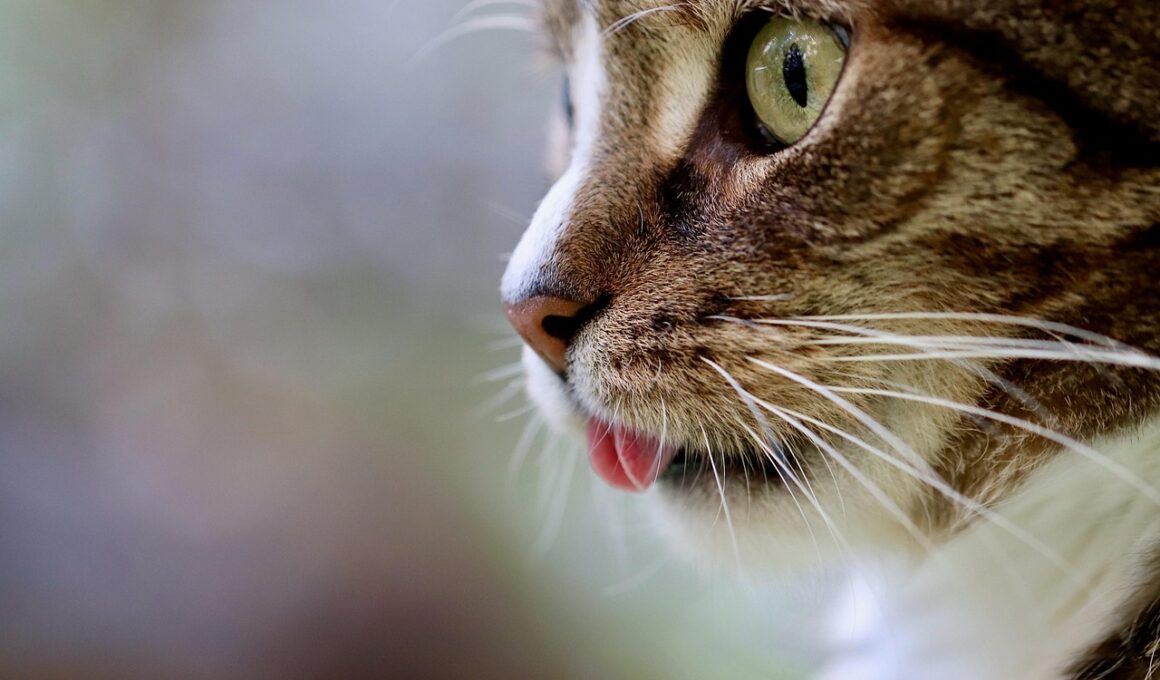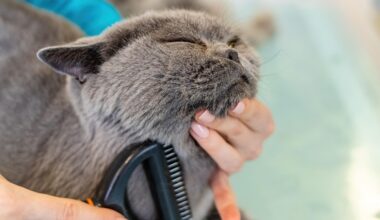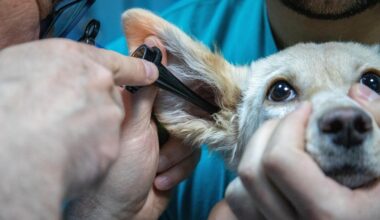Managing Chronic Infectious Rhinitis in Older Cats
Chronic infectious rhinitis is a common issue affecting older cats, and managing this condition is crucial for maintaining their quality of life. It presents as a persistent inflammation of the nasal passages, often leading to a runny nose and difficulty in breathing. The symptoms can severely impact a cat’s appetite and overall well-being. As such, understanding the underlying causes is essential for effective management. Various infectious agents, including viruses and bacteria, can contribute to this condition. Therefore, a thorough veterinary evaluation is necessary to determine the most appropriate treatment plan for your cat. Implementing supportive care, including maintaining a humid environment and ensuring proper hydration, can significantly alleviate symptoms, helping older cats breathe with more ease. In addition, nutritional support in the form of high-quality food can boost the immune system and promote recovery. Regular veterinary check-ups will ensure ongoing assessment and adjustment of treatment protocols as needed, providing tailored care that best suits your feline companion. Furthermore, being vigilant for any complications or worsening symptoms will aid in early intervention, allowing your cat to live a healthier, more comfortable life.
One of the key factors in managing chronic infectious rhinitis is understanding the various symptoms associated with this condition. Common symptoms include nasal discharge, sneezing, coughing, and sometimes, fever. If your cat exhibits persistent or worsening symptoms, it is vital to contact your veterinarian promptly. Early diagnosis can better inform treatment strategies, improving your cat’s comfort. Another important aspect is recognizing that this condition can lead to secondary infections, making vigilant observation essential. Carting a log of your cat’s symptoms can help track changes, making it easier for the vet to adjust treatments effectively. In addition to pharmacological interventions, there are also home remedies that may alleviate some discomfort. For instance, steam inhalation or humidifiers can create a soothing environment that eases breathing difficulties. Cats with chronic rhinitis often require individualized treatment plans, so working closely with your veterinarian is essential. Proper medication, including antiviral or antibiotic therapies, can eliminate the bacteria or viruses responsible for the infection. An understanding of your cat’s condition will allow for more effective communication with veterinary professionals, resulting in better management strategies tailored to your kitten’s specific needs.
Environmental Considerations
The living environment plays a pivotal role in managing chronic infectious rhinitis in older cats. Reducing exposure to potential irritants, such as dust, smoke, or strong odors, can significantly improve your cat’s condition. Investing in air purifiers or HEPA filters can help minimize the presence of airborne allergens. Avoiding harsh cleaning products and opting for natural alternatives can also benefit your feline companion. A clean, quiet space reduces stress, allowing older cats to feel secure and comfortable. Regular veterinary advice is necessary when making adjustments to the home, as some changes may have unforeseen consequences. Thoroughly cleaning secondhand items and integrating frequent vaccinations can also help reduce the chances of exposure to infectious pathogens. Moreover, providing a well-balanced, nutritious diet tailored towards older cats can stabilize their immune systems, further protecting them against infections. Remember, changes in routine or environment can affect your cat’s temporal behavior, so gradual transitions are essential. Keeping a consistent daily schedule for feeding and care can foster a sense of safety. All these aspects contribute to a comprehensive plan for managing chronic infectious rhinitis effectively.
Nutrition also plays a significant role in managing chronic infectious rhinitis in older cats. Providing a diet rich in essential fatty acids and antioxidants can aid their immune system, helping them combat infections. Opt for high-quality cat food that contains ingredients beneficial for respiratory health. Wet food may also be more appealing to cats experiencing nasal issues and can encourage hydration. If appetite decreases, consider offering warm, aromatic meals to entice your cat. A veterinarian may also recommend specific supplements or medications to support overall health further. It’s essential to keep up with your cat’s weight and nutritional needs as alterations may reflect their health status. Ensuring dental health is also critical, as poor oral hygiene can contribute to chronic infection. Regular dental check-ups and home care fulfill this need. Keeping your cat’s weight within a healthy range is equally important; obesity can exacerbate respiratory issues. Integrating playful physical activity that suits their ability can foster better health. Engaging with your older cat in gentle play stimulates them mentally and physically, supporting their recovery journey. Balancing nutrition and physical care provides a solid foundation for effective management.
Regular Vet Check-ups
Regular veterinary check-ups are crucial in managing chronic infectious rhinitis and promoting the health of older cats. Veterinary visits enable comprehensive health assessments, ensuring that underlying conditions are identified early. Vets can perform diagnostic tests, such as blood tests or imaging, to better understand your cat’s health status. Ensuring your cat stays up to date on vaccinations and preventive care will help reduce the risk of infections. These visits also provide an excellent opportunity for discussing any observed changes in your cat’s behavior or symptoms. Keeping an open line of communication with your veterinarian aids in ongoing assessments and adjusting treatment plans as necessary. Your vet may also be able to suggest specific dietary changes or supportive therapies tailored to your cat’s unique needs. Regularly scheduled visits foster a series of examinations over time, allowing the vet to observe trends and make informed recommendations quickly. Furthermore, these appointments relieve any concerns associated with minor conditions before they escalate. Facilitating these consultations builds an ongoing care relationship, giving your older cat the best chance of recovery and long-term well-being.
Behavioral changes can also occur in older cats suffering from chronic infectious rhinitis. Due to discomfort, your cat may become less sociable, more irritable, or withdraw from previous activities they enjoyed. Monitoring these behavioral changes is essential for understanding their emotional state during recovery. Providing a calm, quiet environment allows your cat to rest and recuperate, essential for managing this condition. Creating a dedicated, cozy resting area with familiar items can help alleviate stress. Gentle petting and interaction can maintain a sense of normalcy in your cat’s routine. The emotional bond between you and your cat is vital, so compassion during this challenging time is essential. Be observant of any signs of distress; they might suggest pain or discomfort beyond nasal congestion. Maintaining a diary of your cat’s behavioral changes can provide invaluable insights. Working closely with your veterinarian will ensure that both physical and emotional aspects of care are attended to. Recognizing emotional well-being as part of the recovery process is crucial. The journey may require patience, but by being attentive, you can foster a loving environment that supports your older cat’s recovery from chronic infectious rhinitis.
Conclusion
In conclusion, managing chronic infectious rhinitis in older cats involves a comprehensive approach encompassing various factors. Understand that this condition requires immediate attention with supportive care to maximize quality of life. Emphasizing regular veterinary visits, proper nutrition, and attention to emotional well-being provides a solid foundation for your cat’s health management. By staying informed about symptoms and changes in behavior, you will be more prepared to communicate effectively with your veterinarian. Incorporate environmental adjustments aimed at reducing irritants and fostering a comforting atmosphere. Tailored dietary recommendations can bolster immune health, creating resilience against infections. Look for signs of secondary infections, as ongoing assessment of health will provide timely interventions when necessary. All these elements together advocate for an integrated respiratory health plan that prioritizes your older cat’s comfort and longevity. Chronic infectious rhinitis can be managed with diligence, love, and excellent care, allowing your feline friend to lead a happy, fulfilling life. Stay observant and proactive, as the sooner you initiate interventions, the better the potential outcomes will be for your cat in navigating this challenging health issue.
Alongside regular veterinary care, fostering a supportive home environment is crucial. Make adjustments to your cat’s living conditions, which may include increasing humidity and minimizing stress factors. Scented products should be avoided as they can provoke symptoms. All these approaches help create an environment conducive to recovery, allowing your older cat to thrive despite chronic infectious rhinitis. Embrace ongoing efforts to lift your cat’s health trajectory, recognizing the impressive resilience they showcase despite challenges. Being attentive and nurturing are keys to the way forward.


